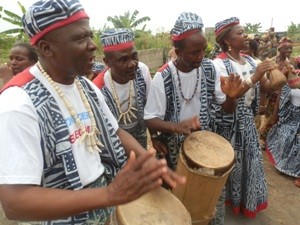
These dances would be publicized abroad and get tourists and volunteers discover the conservation sites in the Country through the people’s culture. These dances it is hoped will give a new impetus to conservation efforts and equally help towards developing aspects of cultural tourism in conservation. Animal species are intrinsically linked to the cultures of the people and it becomes imperative that these two be incorporated to help each other.
Dances, it should be remembered can go a long way to help in the conservation of species in the forest. The Bakweri people in the South West of Cameroon, have the Maale dance which reenacts the activities of the elephant. It is a denizen of the Mount Cameroon Forest and even if there are threats on the elephant, this dance helps in conserving the species. The Nweh Mundani in the Lebialem Highlands of South West Cameroon people pound their nuts to the rhythmic sound of the Chimp or Gorilla. The Dance for the Earth initiative by IUCN was in a guise to develop this. This program when developed will permit volunteers coming to visit the project sites to enjoy some different cultural performances of the different tribes of Cameroon before they go to the forest. This will further act as incentive for the traditional people to preserve these dances and pass them on to younger generations.
By Ita Nawom



